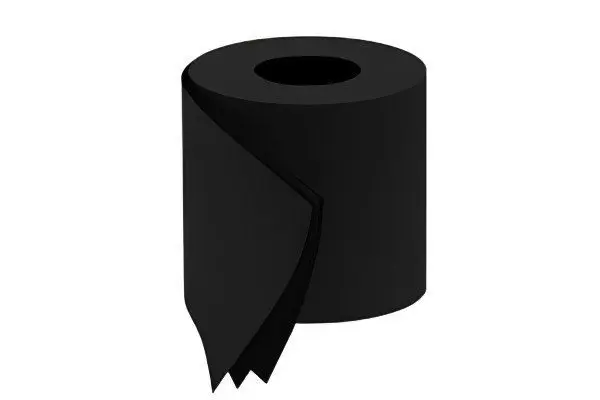Contents
Staining of feces in black does not always become a dangerous symptom, although normally the stool of a healthy person has a brown color of various shades. Almost every person notices the slightest changes in the color and consistency of feces, because he knows the features of his own stool.
The brown color of the feces is due to the fact that they contain particles of undigested food eaten during the last 2-3 days, and bile that participated in the processing of the food bolus.
What does black stool say?

Possible causes of black feces can be pathologies of the stomach and intestines, complications of serious diseases.
What to do if an adult or a child has a black stool:
Analyze a set of foods eaten over the past few days;
For several days, observe changes in the color, consistency and frequency of the stool.
The list of products should include all drinks, vitamins, and medicines taken by a person. If the reason for the discoloration of feces is certain foods or medicines, you should not be afraid that negative changes have occurred in the body.
It can be:
Beet,
Grape,
Prunes,
Activated carbon,
Medicines containing iron.
It is important to carefully study the instructions for using the medicine in order to anticipate such a side effect as a black tint of feces.
If the set of foods used has not changed recently, and there was no need to take medication, if black stool appears, you should urgently seek medical help. A possible reason for such changes is internal bleeding that has arisen due to the intake of drugs that reduce blood clotting. They do not change the color of feces, but provoke bleeding in the digestive tract, which is extremely dangerous if the patient is not provided with medical care in a timely manner.
If the normal color of feces changes to black due to the alleged use of fecal-staining foods or drugs, it is worth watching your stool. If, after removing the product from the diet or withdrawing the drug, the color of the feces returned to normal after a few days, you can not be afraid of pathological changes in the body.
If after these events changes in the color of the stool are periodically observed, and its consistency becomes liquid, an examination should be carried out to determine the cause of such changes.
General symptoms in the presence of black stools

A person whose stool has changed color may change appearance, mood and well-being. Looking from the side at an adult or child with such a symptom, it is easy to see whether his appearance has remained the same or has become painful. The absence of discomfort and good health against the background of the use of certain foods or drugs that provoke the appearance of a black tint of feces confirms the norm of the state of health.
The following manifestations indicate that the patient needs the help of a doctor:
Heartburn,
Nausea and vomiting;
Alternating constipation and diarrhea;
Pain in the epigastric region.
It is worth alerting if there is a history of hepatitis, cancer, cirrhosis, stomach ulcers. It is possible that the black color of feces is a sign of a complication of existing diseases.
Dangerous symptoms that have arisen against the background of a change in the color of feces:
Increase in body temperature;
A history of gastric or duodenal ulcer, cirrhosis, oncological diseases;
Nausea and vomiting;
Alcohol poisoning, accompanied by severe vomiting shortly before the appearance of a black tint of feces;
Repeatedly detectable anemia in a blood test.
Causes of black stool

The color of feces in black when using certain foods or drugs can be either uniform or have a granular structure. Dark spots in the stool are the remains of undigested food and drugs that give color to the stool as a result of a biochemical reaction.
Sometimes parents panic when they find black worms in the child’s feces, mistaking them for worms. Meanwhile, these are the undigested remains of a banana eaten the day before. Parasites are almost always light in color.
The black shade of feces in some cases indicates the presence of internal bleeding in the gastrointestinal tract. It can be provoked by an ulcer, polyps, varicose veins of the esophagus. After the blood enters the stomach, it falls under the action of gastric juice, its color changes from red to black. Excrements take the same color. Additional symptoms of this pathology are pallor, weakness, dizziness. When they appear, you should immediately seek medical advice.
Causes of blood in the stool:
Ulcerative colitis,
Crohn’s disease,
Acute form of lymphoblastic leukemia;
Gastritis,
hookworm,
Histoplasmosis.
When bleeding in the lower intestines, the blood does not undergo transformation and enters the feces, retaining its red color. With weak intestinal peristalsis, blood from the source of bleeding, even located at the beginning of the colon, stains the feces black. In this case, the hemoglobin of the blood is processed into hemin, which has a dark color.
If black stools appear immediately after surgery, the dark color of feces indicates internal bleeding and the need for immediate medical attention. In the presence of black stools in combination with elevated body temperature, the symptoms indicate a possible intestinal infection and the need for intervention by an infectious disease specialist.
Pregnancy is not a reason for a change in the color of the stool and disorders of the gastrointestinal tract, therefore, a similar symptom of a change in the color of the stool in a woman who is expecting a child has the same reasons as in the normal state.
What to do if black feces appear in children?

Serious pathologies, the symptom of which may be internal bleeding and a dark shade of feces, are very rare in children. When black feces appear in a child, parents should pay attention to the children’s diet and the products that fill it.
The original feces, or meconium, excreted in newborns is very dark in color. This is a natural phenomenon, so do not worry when it occurs. After 2-3 days, the baby’s stool against the background of breastfeeding becomes light yellow, it has a liquid consistency.
Feeding infant formula milk with vitamins and iron supplements can darken stools. If the baby has a normal appetite, he is not naughty, sleeps peacefully, the dark shade of feces will not harm the child’s body. When joining the temperature, restless behavior and other negative symptoms, you should consult a doctor, regardless of the age of the children.
If feces that are atypical in color and consistency appear in a child, you should contact a pediatrician to determine the tactics of treatment and diagnose the cause of the pathology. Symptoms such as pain syndrome, high temperature in a child against the background of black feces are a reason to call an emergency ambulance. They indicate poisoning or internal bleeding, therefore, the sooner professional medical assistance is provided, the better the future prognosis of the child’s condition.









